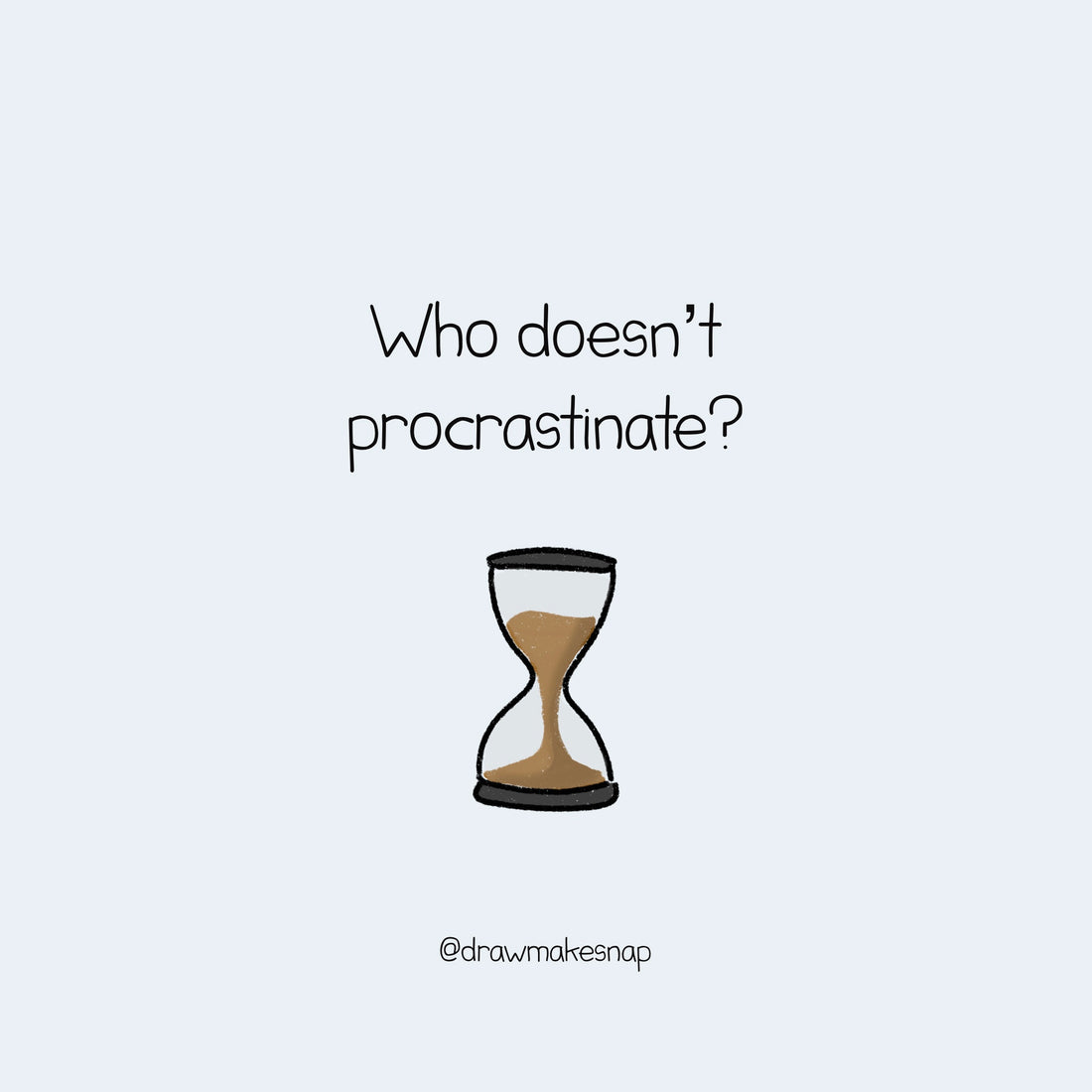
Who doesn't procrastinate?
Share
Hands up if you don't procrastinate. Okay, then this article is not for you. Kudos to your strict self-discipline, constant motivation to be doing exactly what you should be doing at all times of the day. Seriously, do you really exist??
I belong to the darker side. Just like most of you reading this. I procrastinate every... single... day... Even now, as I'm looking at the clock, thinking about the chicken rice that I had for lunch and that it's almost time to get changed for my run... I'm sitting here typing away naively thinking that I can get this blog post out in less than 15 minutes.
There was a TED talk video by Tim Urban: Inside the mind of a master procrastinator. It's really good, you should watch it. He talks about this instant gratification monkey inside of us, that steers us away from what we SHOULD be doing... only until when the panic monster appears (which is often THE deadline) that spurs us to finish our tasks within a jiffy (but of coz, compromising on the quality of our work most of the time). Does that sound familiar?
Mel Robbins speaks of procrastination as a habit that we can overcome using the 'five-second technique'. In her words, “When you feel hesitant before doing something that needs to be done, count in your head ‘5-4-3-2-1-GO’ and take action immediately. Hesitation is the kiss of death. You might hesitate for a nanosecond, but that’s all it takes. This little hesitation triggers a mental system designed to stop you. And it happens in less than – you guessed it – five seconds.” I love this technique - simple and easy to use. I've tried it myself too but it's not a guaranteed success. I mean, you have to WANT to start counting down to five in order for this technique to work. What if I'm procrastinating even to start counting!?
In Atomic Habits, author James Clear defines the reason why people procrastinate - "due to tendency to care too much about our present selves and not enough about our future selves. We like to enjoy immediate benefits in the present, especially if the costs of our choices don't become apparent until far in the future", which is very similar to Tim Urban's theory of the instant gratification monkey in us. James Clear went on to describe ways that we could help beat procrastination.
1. Make the rewards of long-term behavior more immediate
To motivate myself to go for a run, I could visualise those days that I actually did - how I felt after the run, the feeling of accomplishment, the good vibes after a good workout, improved appetite, good night's sleep etc). These are the 'short-term rewards' if I were to go for a run.
2. Make the costs of procrastination more immediate
I could arrange to run with a friend so there's accountability and the costs of procrastination would not just involve me alone but the fact that I may disappoint a friend if I don't turn up.
3. Remove procrastination triggers from your environment.
If I'd like to eat healthily, removing procrastination triggers would simply mean not having to buy unhealthy snacks at home, not suggesting to go to places (like fast food joints) for meet-ups with friends, etc.
Those above are examples of my own that have worked for me, on some occasions. You may read more about his theory from his book, 'Atomic Habits'. This is one of my favourite productivity books by far and I'm still using some of the methods that helps me build new habits and maintain them.
Finally, there is also this term call, 'productive procrastination' - which interestingly was a topic of presentation by one of my students early this week. It also has its pros and cons and the danger of us succumbing to procrastinating more. But if done right, I guess we could actually get something beneficially done while procrastinating on something else, or allowing us to take our much needed breaks before embarking on our tasks.
After hearing from all the experts, these are my takeaways:-
(1) There is no single fool-proof way to beat procrastination
With all the studies and statistics that we see, the motivational talks that we hear, inspiring books and articles that we read - all of which (the suggestions and takeaways) will likely last as long as our memory can hold and as far as our willpower can last. At the end of the day, with all the knowledge that we have, all the techniques that were taught to us, we need to find a customised solution that will work for ourselves - uniquely for ourselves. Or a variety of methods that we could fall on whenever we catch ourselves procrastinating.
(2) Be kind to yourself
If you're going to beat yourself up and wallow in self-pity that you are someone with no self-discipline, you're wasting your time and not doing anything productive... This is nothing but just toxic guilt - a type of guilt that does not motivate you to make positive changes. Are you feeling bad for yourself or the actions that you've chosen to make? If it's the latter, then don't waste your time beating yourself up. Recognise that you needed the break or the time-off from your work/studies and look ahead to plan what you can do for yourself henceforth.
If you could only remember one thing from this article let it be this - 'Look forward and do something today (or tomorrow) that your future self will be proud of.'
Okay, I'm going for my run now ;)
